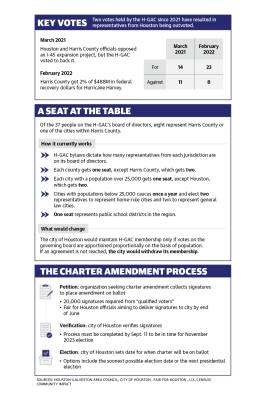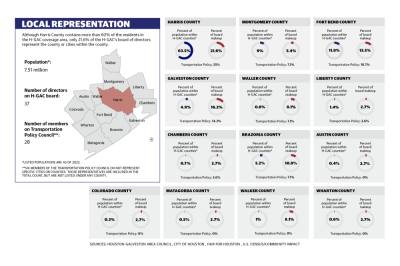The effort relates to restructuring two boards within the Houston-Galveston Area Council, said Evan Choate, an organizer with the Fair for Houston campaign. Members on the H-GAC board of directors represent a wide cross-section of the 13-county area, but Choate said suburban and ex-urban communities in the region are overrepresented at the expense of more urban areas, including the city of Houston and Harris County. The effort also targets the Transportation Policy Council, which covers eight counties.
An analysis by Community Impact of the H-GAC's board of directors found 21.6% of the board represents Harris County or cities within Harris County, including Houston, Pasadena and Deer Park. However, Harris County contains roughly 63.5% of the overall population within the 13 county area.
Two board members each represent Houston and Harris County themselves, a result dictated by the H-GAC's current bylaws.
Choate said there have been several instances where the H-GAC board voted in a way that broke away from Harris County members, including a March 2021 vote to support a controversial I-45 expansion project and a February 2022 flood control funding vote that saw Harris County get 2% of the $488 million pot.
“It’s about making sure money is being fairly distributed, which is not what is happening now,” Choate said.
H-GAC’s Executive Director Chuck Wemple said it is rare for the agency’s board to be split on a vote, with many split votes tied to disaster recovery, which often comes with complex decisions. Harris County was allocated only 2% of flood funding following long conversations that took into account a previous allocation of $750 million from the state's General Land Office, he said. Many decisions are influenced by the H-GAC’s advisory councils, made up of local subject matter experts.
Wemple said he is open to the idea of revisiting how boards are structured but said he would rather see an open discussion take place instead of resorting to a charter amendment. Following the 2020 census, Wemple said the H-GAC formed a committee to explore reshaping the board composition. The committee, chaired by a Harris County representative, recommended the board composition be left as is.
Fair For Houston needs to gather 20,000 signatures for the petition to be considered by the city of Houston. The vote would give Houston voters the chance to amend the city’s charter to compel the H-GAC to negotiate with the city of Houston on making the board more reflective of population.
Wemple said he thought the language of the charter amendment left enough room for the H-GAC and the city of Houston to have a conversation and figure out what would be best.
"I am glad it's not super prescriptive, because that might eliminate the conversation opportunity," he said. "I think there's enough space in there that we could certainly give it our best shot."
The charter amendment calls for the city to "withdraw its membership from the body if the voting system is not corrected" within 60 days of the effective date of the amendment.
If the amendment passes, Choate said he was comfortable the result would be a better deal for Houston, regardless of what happens. Because MPOs must include the region's largest city, Houston's exit from the H-GAC would start a process where the city creates a new MPO that must represent 75% of the region's population.
As of press time, Mayor Sylvester Turner did not respond to request for comment. Sallie Alcorn, Houston City Council member and chair-elect of the H-GAC board of directors, said her office had requested a full analysis of H-GAC funding allocations and was expecting to receive it May 4. She said she is withholding comment until after reviewing the analysis.
As of late April, Fair for Houston had gathered about 10,000 signatures. Once the petition is submitted, the city would have until Sept. 11 to make the decision to place the amendment on ballots for the November election.







